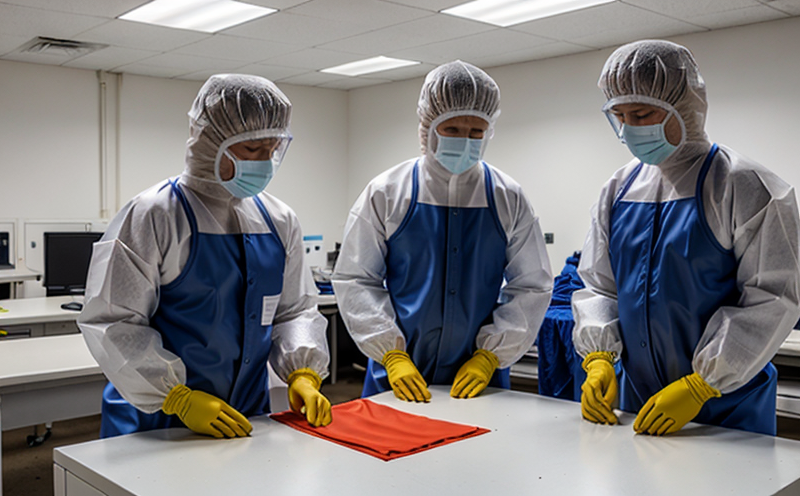ASTM F903 Protective Clothing Liquid Chemical Resistance Testing
The ASTM F903-18 Standard Test Method for Determining the Permeation of Liquids by Protective Clothing Materials is a critical standard in the occupational safety and protective equipment testing sector. This test evaluates whether protective clothing materials, used in various industrial settings like chemical manufacturing or laboratory environments, can effectively shield workers from hazardous liquid chemicals.
The ASTM F903 protocol assesses the permeation of liquids through fabrics using a series of controlled experiments that simulate real-world conditions. The testing process involves placing the material under pressure with a solution and monitoring for any penetration over time. This ensures that protective clothing remains an effective barrier against harmful chemicals, thereby safeguarding worker safety.
The methodology is particularly important in industries where workers are exposed to a wide range of potentially hazardous liquids, such as solvents, acids, or alkalis. By adhering strictly to ASTM F903 standards, manufacturers can demonstrate that their products meet the highest safety and performance criteria. This not only enhances worker confidence but also fulfills regulatory requirements set by occupational health and safety organizations.
Eurolab’s expertise in this area ensures that we provide accurate, reliable testing services tailored to the needs of quality managers, compliance officers, R&D engineers, and procurement professionals. Our state-of-the-art facilities and experienced team ensure that every test is conducted with precision and repeatability, providing clients with confidence in their product performance.
- Our laboratories are equipped with advanced instrumentation to accurately measure the permeation rates of various chemical solutions through different protective clothing materials.
- We use standardized procedures to prepare specimens according to ASTM F903 guidelines, ensuring consistent and comparable test results.
- Data analysis is conducted using sophisticated software that interprets raw data into meaningful insights regarding material performance under specified conditions.
In summary, Eurolab’s compliance with ASTM F903 provides a robust framework for evaluating protective clothing materials against liquid chemical exposure. This service not only meets regulatory standards but also contributes significantly to enhancing workplace safety and reducing occupational health risks.
Scope and Methodology
The ASTM F903-18 test method encompasses a comprehensive approach to evaluating the liquid chemical resistance of protective clothing materials. It is designed to determine the permeation rates of various liquids through these materials, which are crucial for understanding their performance in real-world scenarios.
The scope includes specifying the types of specimens that can be tested, the chemicals that can be evaluated, and the conditions under which testing should occur. This ensures that all parties involved have a clear understanding of what is expected from the test results. The methodology outlines detailed procedures for preparing and handling samples, applying pressure and chemical solutions, monitoring permeation rates, and interpreting data.
For specimens, ASTM F903 allows testing on both single-layer materials and multilayer assemblies commonly found in protective clothing. This flexibility accommodates a wide range of industrial applications where different types of fabrics may be used together for enhanced protection. The test covers numerous chemical agents, including but not limited to acids, bases, organic solvents, and other hazardous substances.
Pressure application is critical during the testing process as it simulates the conditions under which workers might encounter liquid chemicals. By maintaining consistent pressure levels throughout the duration of the experiment, we ensure that any permeation detected can be attributed directly to material properties rather than external factors. Continuous monitoring allows us to capture early signs of permeation accurately.
Data interpretation involves statistical analysis of collected data points over time. This helps establish meaningful thresholds for acceptable performance levels based on industry standards and best practices. Reporting these findings clearly and concisely is essential for stakeholders who rely upon accurate information when making decisions about protective equipment purchases or modifications.
Eurolab Advantages
At Eurolab, we pride ourselves on offering unparalleled expertise and reliability in ASTM F903 testing for protective clothing. Our comprehensive suite of services includes advanced instrumentation, precise specimen preparation, rigorous data analysis, and clear reporting tailored to meet your specific requirements.
- Innovative Instrumentation: We utilize cutting-edge equipment capable of detecting even minute amounts of chemical permeation through protective clothing materials. This precision ensures accurate evaluation results.
- Experienced Team: Our skilled technicians possess extensive knowledge in both laboratory techniques and industrial applications, allowing them to provide valuable insights beyond just test outcomes.
- Comprehensive Reporting: Detailed reports are generated following each ASTM F903 test, providing comprehensive information about performance metrics along with recommendations for improvement where necessary.
By leveraging these advantages, Eurolab guarantees that our clients receive top-notch testing services aligned with international standards. Whether you need assistance complying with regulatory requirements or simply wish to improve product quality through rigorous evaluation, we are here to support your needs effectively.
Environmental and Sustainability Contributions
The ASTM F903 Protective Clothing Liquid Chemical Resistance Testing plays a vital role in promoting environmental sustainability by ensuring that protective clothing materials do not compromise worker safety while minimizing environmental impact. By accurately assessing the performance of these fabrics against hazardous chemicals, we help manufacturers develop more effective yet sustainable products.
- Reduced Waste: Accurate testing helps identify optimal material compositions and design improvements early in the development cycle, reducing unnecessary prototyping and waste associated with suboptimal designs.
- Promoting Recycling: Materials that pass stringent ASTM F903 tests are less likely to degrade or break down due to chemical exposure, making them more suitable for recycling at end-of-life stages.
- Eco-friendly Production Processes: Ensuring high standards of protection encourages manufacturers to adopt cleaner production methods, further contributing to reduced ecological footprints across the supply chain.
In conclusion, Eurolab’s commitment to ASTM F903 testing supports broader sustainability goals by fostering innovation in protective clothing technology without sacrificing environmental responsibility. Through our meticulous approach and deep expertise, we contribute positively towards creating safer working environments while preserving natural resources for future generations.





